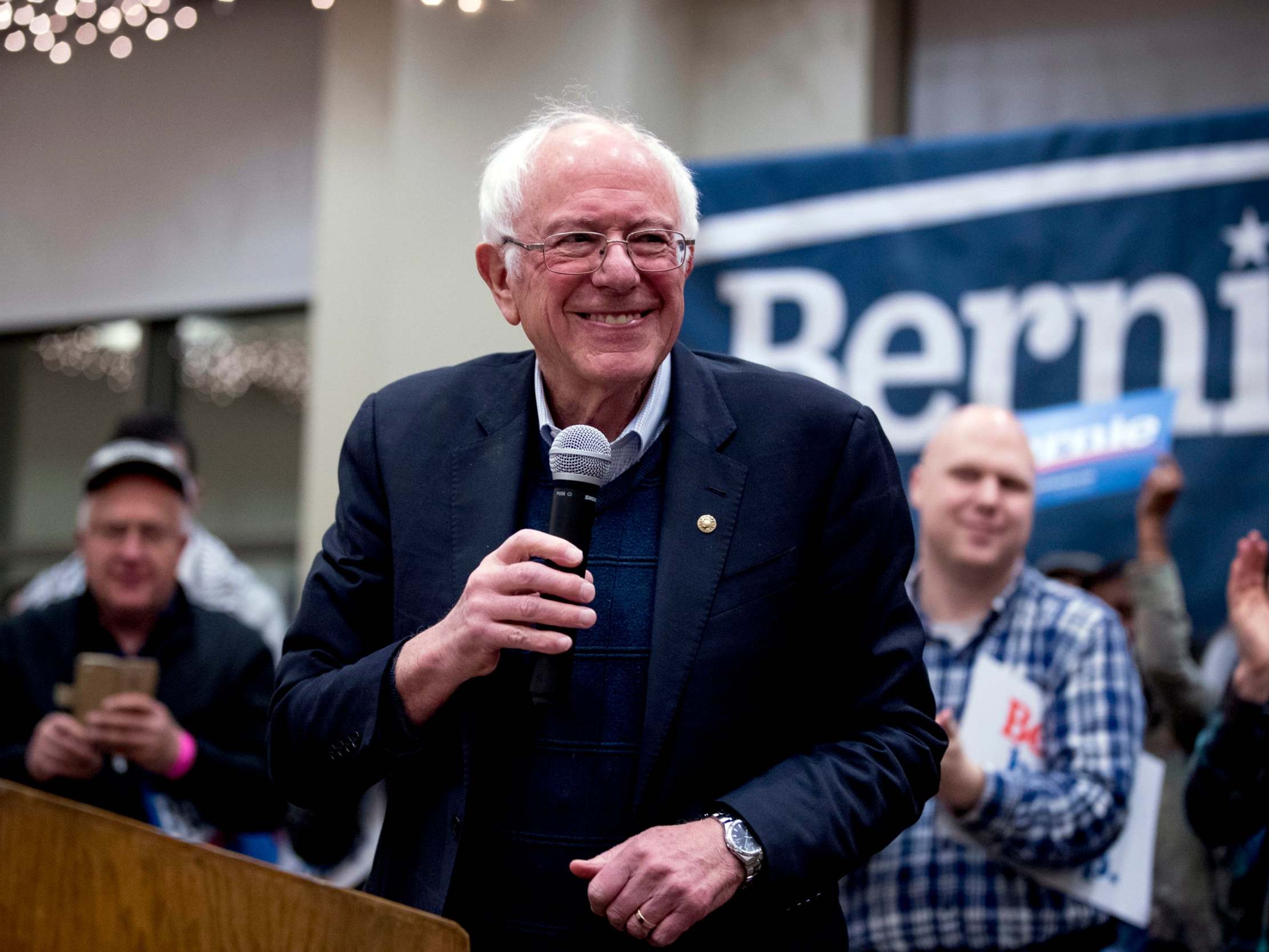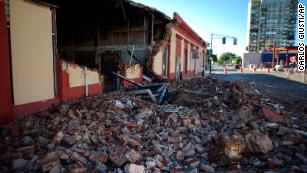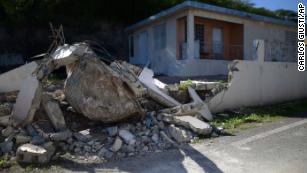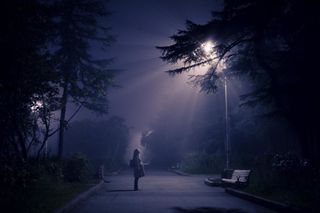‘I don’t get to say anything as a voter, but I hope that there will be a major change’
PUERTO RICANS DO NOT GET TO VOTE FOR POTUS
STATEHOOD OR INDEPENDENCE NOW!
Chris RiottaNew York @chrisriotta

When Donald Trump came to Puerto Rico after Hurricane Maria and threw paper towels into a crowd of American citizens who were desperate for food and essential resources, Nilsa Lassalle says she felt “angry, disappointed and most of all, humiliated”.
The president declared a major disaster in Puerto Rico’s southern region on Thursday, weeks after a series of destructive magnitude 5 earthquakes shook the island in late 2019 and early January.
His announcement came the same week the White House attached severe restrictions on emergency relief meant to aid Puerto Rico in its recovery efforts following the deadly Hurricane Maria. The hurricane hit in September 2017, but such was the devastation it wrought on Puerto Rico – as well as nearby Dominica and St Croix – that recovery efforts continue to this day. While releasing the funds, the Trump administration halted the island’s $15 (£11.48) minimum wage and blocked money going towards its electric grid.
Lassalle, a 53-year-old Puerto Rican mother, says she doesn’t expect the president to treat Puerto Rico any differently after the earthquakes than he did after the hurricane.
“Looking back, I’m not surprised at all by how Donald Trump is reacting to the earthquakes in Puerto Rico,” she said. “What can we expect from somebody that treats everyone like that – men, women, immigrants, the press … I’m not surprised by anything he does now.”
Like many other young Puerto Ricans, Lassalle’s daughters have both relocated to the mainland United States, citing a lack of job prospects and economic challenges years before Hurricane Maria. Lassalle attributes these challenges to corruption within the local government, as well as the United States’ “chokehold” on the island.

‘I’m not surprised by anything Trump does now,’ says Nilsa Lassalle
“[The US] profits from Puerto Rico, and controls everything we do,” Lassalle says. “We have to buy all of our imports from the US, there are so many regulations, and we can’t declare bankruptcy.”
On top of it all, Lassalle notes that Puerto Ricans cannot vote in the presidential elections: “It would be beneficial for us to be included, because we are American citizens. We are somehow a part of your country, and the fact that we don’t get a say in politics here leaves us in limbo.”
Despite not being able to cast a ballot in the 2020 elections, Lassalle has been paying attention to the Democratic primaries and candidates along the campaign trail.
Nationally, she says she’s most focused on issues like immigration, healthcare and taxes. But when it comes to Puerto Rico, Lasalle wants a president who will bring more opportunities to the island and wipe out its debt.
“Because so many young people have left the island, Puerto Rico is filled with many people from the older generations, and they aren’t usually open-minded to more progressive ideals or candidates,” she explains while discussing the debate as to whether Puerto Rico should become a US state.
Lassalle believes that Puerto Rico can and should achieve independence. She cites the recent uprisings that ousted former Governor Ricardo Rossello and others from his administration. The disgraced governor faced protests and demands to resign after he was exposed for corruption and had his misogynistic text messages leaked to the media.
“I wish Puerto Rico would be an independent state. I have seen after Hurricane Maria – but even before that – the people here have the power to lift Puerto Rico,” she says while recalling the weeks of demonstrations. “This has never happened before in Puerto Rico … people are thirsty for change – definitely.”
And when it comes to addressing the issues impacting Puerto Rico and the United States writ large, Lassalle says she now sees only one candidate for the job: Bernie Sanders.
Whereas at first Lassalle says she supported Joe Biden’s candidacy, citing the former vice president’s experience in the White House and reputation as a longtime senator, she now believes Sanders has a “more complex understanding of the human condition and where we are now as a country, and maybe even as a world.”
“He just seems more inclined to respond to the issues that affect people,” she adds. “We’re not the 1 per cent, and he addresses our issues ... important issues like immigration, student debt and healthcare.”
Sanders introduced a $146bn (£111.7bn) plan in 2017 to help rebuild Puerto Rico after the hurricanes, which included investments in renewable resources and green technology. That legislation featured six co-sponsors, one of whom was fellow 2020 hopeful Elizabeth Warren.
The Vermont senator has also called for some of Puerto Rico’s debt to be immediately relieved if deemed unconstitutional, and has suggested a fiscal oversight board implemented by the US congress was anti-democratic in nature.

When Donald Trump came to Puerto Rico after Hurricane Maria and threw paper towels into a crowd of American citizens who were desperate for food and essential resources, Nilsa Lassalle says she felt “angry, disappointed and most of all, humiliated”.
The president declared a major disaster in Puerto Rico’s southern region on Thursday, weeks after a series of destructive magnitude 5 earthquakes shook the island in late 2019 and early January.
His announcement came the same week the White House attached severe restrictions on emergency relief meant to aid Puerto Rico in its recovery efforts following the deadly Hurricane Maria. The hurricane hit in September 2017, but such was the devastation it wrought on Puerto Rico – as well as nearby Dominica and St Croix – that recovery efforts continue to this day. While releasing the funds, the Trump administration halted the island’s $15 (£11.48) minimum wage and blocked money going towards its electric grid.
Lassalle, a 53-year-old Puerto Rican mother, says she doesn’t expect the president to treat Puerto Rico any differently after the earthquakes than he did after the hurricane.
“Looking back, I’m not surprised at all by how Donald Trump is reacting to the earthquakes in Puerto Rico,” she said. “What can we expect from somebody that treats everyone like that – men, women, immigrants, the press … I’m not surprised by anything he does now.”
Like many other young Puerto Ricans, Lassalle’s daughters have both relocated to the mainland United States, citing a lack of job prospects and economic challenges years before Hurricane Maria. Lassalle attributes these challenges to corruption within the local government, as well as the United States’ “chokehold” on the island.

‘I’m not surprised by anything Trump does now,’ says Nilsa Lassalle
“[The US] profits from Puerto Rico, and controls everything we do,” Lassalle says. “We have to buy all of our imports from the US, there are so many regulations, and we can’t declare bankruptcy.”
On top of it all, Lassalle notes that Puerto Ricans cannot vote in the presidential elections: “It would be beneficial for us to be included, because we are American citizens. We are somehow a part of your country, and the fact that we don’t get a say in politics here leaves us in limbo.”
Despite not being able to cast a ballot in the 2020 elections, Lassalle has been paying attention to the Democratic primaries and candidates along the campaign trail.
Nationally, she says she’s most focused on issues like immigration, healthcare and taxes. But when it comes to Puerto Rico, Lasalle wants a president who will bring more opportunities to the island and wipe out its debt.
“Because so many young people have left the island, Puerto Rico is filled with many people from the older generations, and they aren’t usually open-minded to more progressive ideals or candidates,” she explains while discussing the debate as to whether Puerto Rico should become a US state.
Lassalle believes that Puerto Rico can and should achieve independence. She cites the recent uprisings that ousted former Governor Ricardo Rossello and others from his administration. The disgraced governor faced protests and demands to resign after he was exposed for corruption and had his misogynistic text messages leaked to the media.
“I wish Puerto Rico would be an independent state. I have seen after Hurricane Maria – but even before that – the people here have the power to lift Puerto Rico,” she says while recalling the weeks of demonstrations. “This has never happened before in Puerto Rico … people are thirsty for change – definitely.”
And when it comes to addressing the issues impacting Puerto Rico and the United States writ large, Lassalle says she now sees only one candidate for the job: Bernie Sanders.
Whereas at first Lassalle says she supported Joe Biden’s candidacy, citing the former vice president’s experience in the White House and reputation as a longtime senator, she now believes Sanders has a “more complex understanding of the human condition and where we are now as a country, and maybe even as a world.”
“He just seems more inclined to respond to the issues that affect people,” she adds. “We’re not the 1 per cent, and he addresses our issues ... important issues like immigration, student debt and healthcare.”
Sanders introduced a $146bn (£111.7bn) plan in 2017 to help rebuild Puerto Rico after the hurricanes, which included investments in renewable resources and green technology. That legislation featured six co-sponsors, one of whom was fellow 2020 hopeful Elizabeth Warren.
The Vermont senator has also called for some of Puerto Rico’s debt to be immediately relieved if deemed unconstitutional, and has suggested a fiscal oversight board implemented by the US congress was anti-democratic in nature.

Democratic presidential candidate Bernie Sanders speaks at a campaign stop at St Ambrose University on 11 January 2020 (AP)
Lassalle says she agrees with those views.
“Puerto Rico has given so much to the United States,” she says. “The US has of course given much to us, but that’s part of being a commonwealth … it’s not Puerto Ricans’ fault that debt exists. We weren’t in control of how that money was handled.”
Whether Sanders wins the Democratic nomination or not, Lassalle says there “needs to be a major shift in American politics with this election,” describing the last four years under Trump as “the worst nightmare ever imaginable.”
“We can’t have another four years of this,” she concludes. “I don’t get to say anything as a voter, but I hope that there will be a major change.”
---30---
















